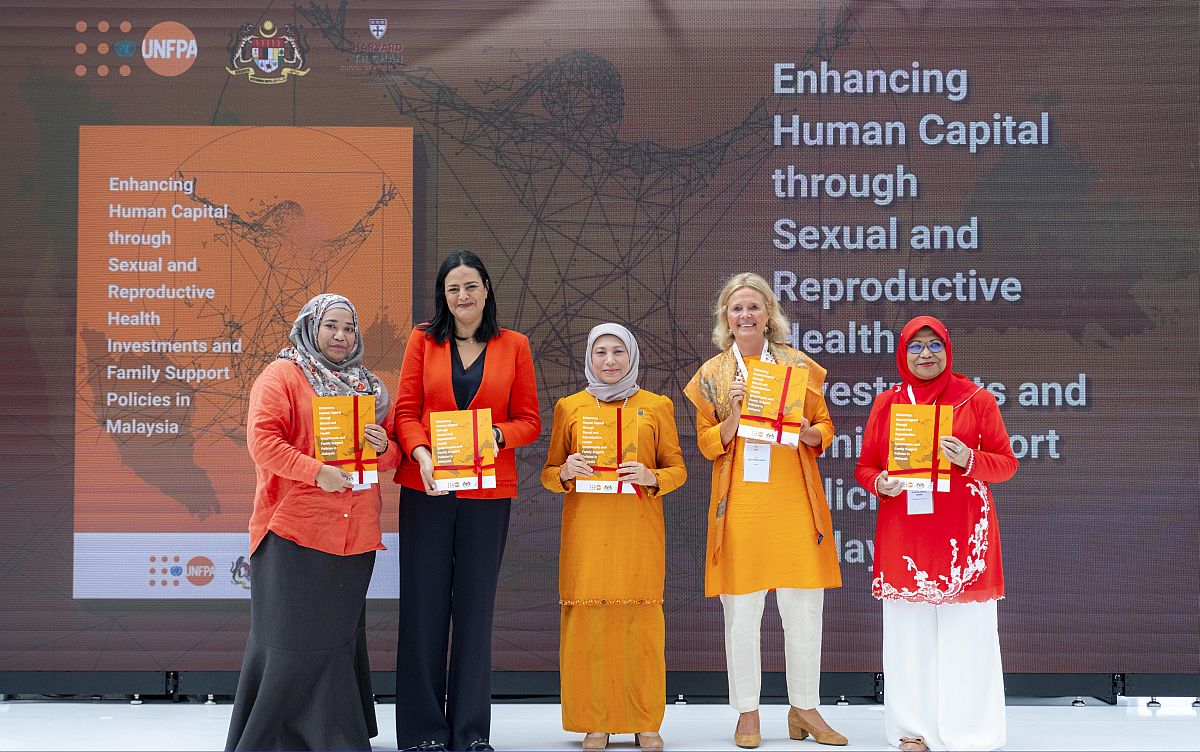KUALA LUMPUR, July 12 – The United Nations Population Fund (UNFPA) marked its 50th year working with the people and government of Malaysia by holding a high tea event, celebrating the occasion with partners from key government agencies, civil society and non-governmental organisations, as well as academics, former civil servants, activists, and members of the media.
Nancy Shukri, Minister of Women, Family and Community Development (KPWKM), in her keynote address, congratulated UNFPA Malaysia on achieving this milestone, highlighting the United Nations agency’s “continuous effort to uplift and embed the rights, welfare, and access to choice for all Malaysians, especially our women and girls”.
In her welcoming remarks, Asa Torkelsson, UNFPA Malaysia’s country representative, emphasised the many years of working closely with KPWKM and the National Population and Family Development Board (LPPKN) “to achieve transformative results, particularly in addressing the unmet need for family planning, gender-based violence, and harmful practices.
“For half a century, since 1973, the UNFPA Malaysia Country Office has worked closely and continuously with the people and government of Malaysia to uplift the quality of life and expanding choices for Malaysians,” said Torkelsson.
Also present at the event were Karima El Korri, UN Resident Coordinator for Malaysia, Singapore and Brunei, Rohani Abdul Karim, chairperson of LPPKN, Nagulendran Kangayatkarasu, secretary-general of the Ministry of Youth and Sports, and Wan Nur Ibtisam Wan Ismail, director-general of the Department of Women’s Development.
The event featured the launch of the much-anticipated report Enhancing Human Capital Through Sexual and Reproductive Health Investments and Family Support Policies in Malaysia, which was jointly funded by the Ministry of Economy, UNFPA Malaysia, and developed by the Harvard T.H. Chan School of Public Health.
The report shows how Malaysia can enhance human capital, via strategic investments in sexual and reproductive health, as well as vital family support policies and services in order to increase the female labour force participation rate and achieve essential national milestones, hence expediting the country’s transition to a high-income nation.
In reference to the launch of the report, Nancy said, “This is an important evidence-based report to justify further investments in sexual and reproductive health and support services especially for our women and girls, by impacting their labour force participation rate, quality of life, family cohesion, access, and of course, addressing the burdens and barriers of unpaid care work”.
“Overwhelmingly done by women, many care activities are often unpaid and unrecognised. Taking into consideration that in Malaysia, women outperform as well as make up over 62 per cent of all undergraduates, the opportunity cost for women and the nation is very high and detrimental,” she said, highlighting that female graduates make up more than half of the current unemployment rate.
Nancy went on to further highlight the importance of attaining vital data on care work, in order to be able to identify care deficits and areas that need to be targeted by policies.
“This will also allow us to value the care economy in terms of time, expertise, opportunity cost, and social merit, and have annual statistics and analysis on this to act upon in each national budget”.
Nancy also announced that her ministry will be collaborating with UNFPA Malaysia to create a realisable and equitable national roadmap towards increasing Malaysia’s female labour force participation rate.
The high-tea event also saw two panel sessions, namely “50 Years of Progress and Beyond: Leaving No One Behind” and “Sexual and Reproductive Health Investments in Malaysia and Its Role in National Development and the 2030 SDGs”.
The first panel session featured perspectives on Malaysia’s challenges and achievements over the past 50 years, achieving UNFPA’s mandates, addressing Malaysia’s ageing nation status and its socio-economic impacts.
The second panel further explored the above topic and delved into the benefits, challenges, and urgency for investments towards sexual and reproductive health access and family support policies.
A special presentation by Tengku Aira Tengku Razif, UNFPA Malaysia’s assistant representative brought into focus the findings and recommendations from the recently launched Enhancing Human Capital Through Sexual and Reproductive Health Investments and Family Support Policies in Malaysia.
Spanning the core thrusts of comprehensive sexuality education, HPV vaccinations, access to family planning, and family support services, she explained that investments into these have rendered a range of highly positive returns.
In her closing address, Torkelsson thanked all of UNFPA Malaysia’s partners and allies across all sectors, including governmental and non-governmental supporters.
She highlighted that UNFPA Malaysia has finalised and agreed with the Malaysian government to further advance its work in Malaysia and called for more emphasis on achieving gender equality.
“When we unlock the full potential of women and girls, encouraging and nurturing our desires for their lives, their families and their careers, we galvanise the leadership, ideas, innovation, and creativity of all towards a better society,” she said.












